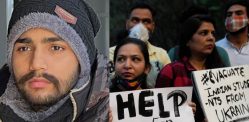"They looked at me like I was in the wrong place."
Paramedic Mahdiyah Bandali spoke of the racist abuse she has faced on the front line.
The 22-year-old from Kings Norton, Birmingham, posted a viral tweet earlier in 2021 about being called a f***ing p*** on an ambulance shift.
The post led to an outpouring of support.
But the paramedic says more needs to be done to tackle Islamophobia in society, including among patients and colleagues.
Mahdiyah graduated in 2018 and since starting her career as a junior paramedic has worked on front line ambulances, in GP services and lectured at a university.
She explained: “My shifts are usually 12 hours but a lot of them do end up being 14 to 15-hour shifts and you’re exhausted by the end of it.
“Especially with winter pressures.
“Being a paramedic has been an emotional rollercoaster and a hard journey.
“It’s a big learning curve – as I came straight out of university and into the job. In the first year, you get thrown onto an ambulance and you’re learning on the road. Nothing prepares you for something like your very first death.”
When Mahdiyah first started working as a paramedic, she did not expect to be one of the only Hijab-wearing paramedics in her team, calling it a “shock”.
She continued: “I went into a profession where you don’t often see people who are of ethnic minorities but now it has been changing – but still there’s a lot to do.
“I think coming as a Muslim female has been unheard of, especially when I went into the profession.
“I remember my first day and there was five or six middle-aged men who were white. They looked at me like I was in the wrong place.”
Being a paramedic is unpredictable and one of the biggest challenges is the abuse faced by paramedics on the front line on a daily basis.
Mahdiyah has been racially abused by patients and at times, by her colleagues.
She told Birmingham Mail: “I remember walking into some of my ambulance stations and hearing ‘here comes the terrorist’.
“It’s excused in the name of banter but it comes to the point where it’s not banter anymore.
“The worst feeling was not having the support from your crewmates.
“As a community, we often communicate with the same people and be attracted to be around people who look like us or practice the same religion – we share similarities.
“Therefore with my crewmates, they never hung out with someone who was a Muslim, so they would only go on what they saw on the news which was Muslims being labelled as terrorists who bomb.
“Some of the outbursts they had against me was due to the lack of education.”
Balancing a duty of care and putting up with abuse has been a major challenge for Mahdiyah. At particularly low points, she considered quitting the profession altogether.
Mahdiyah said: “There’s a couple of incidences where you have been met with verbal abuse and people saying that they don’t want to be touched by a filthy Muslim.
“Whenever something has happened in the media involving Muslims, like the Liverpool attack recently, people automatically point the finger at you as that’s the person they feel represents all Muslims.
“It’s a really difficult decision because at that point I have a duty of care towards that person. I won’t deny, I have walked out from a couple people’s houses when they don’t want to be treated by me.
“I have thought about quitting the job multiple times.”
After sharing her experiences on social media, other ethnic minority paramedics shared the same challenges.
“I met up with the college of paramedics and started to speak to them about the incidents I faced.
“And now we’re trying to increase the amount of diversity and inclusion within the profession. This became one of my means of support.”
Mahdiyah added that there is still a need for more voices.
“In the face of verbal and physical abuse, if I smile or show behaviour of good nature – maybe their misconceptions of what it’s like to be a Muslim will change.
“I’ve managed to get through this and I don’t want others to feel the same.
“In one occasion, I worked with this man who was difficult to get through and I decided to try this curry place with him.
“He ended up loving it and he still goes to the place today. It’s about celebrating differences.”






























































